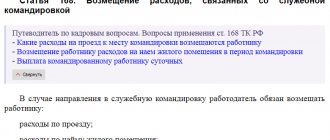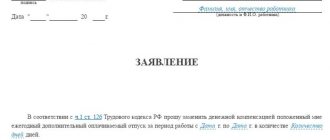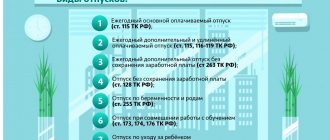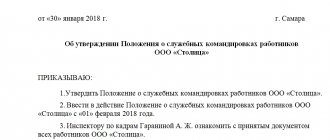Text of Article 325 of the Labor Code of the Russian Federation in the new edition.
Persons working in organizations located in the Far North and equivalent areas have the right to pay once every two years at the expense of the employer the cost of travel and luggage transportation within the territory of the Russian Federation to the place of vacation and back. The employee’s right to compensation for these expenses arises simultaneously with the right to receive annual paid leave for the first year of work in this organization. Federal state bodies, state extra-budgetary funds of the Russian Federation, federal state institutions pay the employee the cost of travel within the territory of the Russian Federation to the place of use of vacation and back by any means of transport (except taxis), including personal ones, the cost of luggage weighing up to 30 kilograms, as well as the cost of travel and luggage transportation to the place where the employee’s vacation is used and back to non-working members of his family (husband, wife, minor children actually living with the employee) regardless of the time of use of the vacation. Payment for the cost of travel of the employee and his family members by personal transport to the place of use of the vacation and back is made at the lowest cost of travel by the shortest route.
Payment of the cost of travel and baggage transportation to the place of use of the vacation of an employee of a federal state body, a state non-budgetary fund of the Russian Federation or a federal state institution and members of his family and back is made upon the application of the employee no later than three working days before departure on vacation based on the approximate cost of travel . The final payment is made upon return from vacation based on the tickets or other documents provided.
The procedure for compensation of expenses for travel and baggage transportation to and from the place of vacation use for persons working in federal government agencies, state extra-budgetary funds of the Russian Federation, federal government agencies, and members of their families is established by regulatory legal acts of the Government of the Russian Federation.
The payments provided for in this article are targeted and are not cumulative in the event that the employee and members of his family do not timely exercise the right to pay the cost of travel and baggage transportation to and from the place of vacation use.
The guarantees and compensation provided for by this article are provided to an employee of a federal government agency, a state extra-budgetary fund of the Russian Federation or a federal government agency and members of his family only at the employee’s main place of work.
The amount, conditions and procedure for compensation of expenses for paying the cost of travel and baggage transportation to the place of use of vacation and back for persons working in government bodies of the constituent entities of the Russian Federation, government institutions of the constituent entities of the Russian Federation, are established by regulatory legal acts of government bodies of the constituent entities of the Russian Federation, in the bodies local government, municipal institutions, - regulatory legal acts of local government bodies, other employers, - collective agreements, local regulations adopted taking into account the opinion of the elected bodies of primary trade union organizations, labor contracts.
N 197-FZ, Labor Code of the Russian Federation, current edition.
When does Article 325 of the Labor Code of the Russian Federation apply?
Art. 325 of the Labor Code of the Russian Federation provides “northern” employees (workers in the Far North and equivalent territories) with an additional guarantee - to go on vacation (alone or with their family) at the expense of the employer.
In Art. 325 of the Labor Code of the Russian Federation establishes that an employee can use this right every 2 years. Northerners can do this regardless of whether they work for a businessman or in a government agency. The main condition is a normatively formalized algorithm for providing compensation.
In particular, compensation parameters for northerners are prescribed:
- for employees of federal authorities, extra-budgetary funds and federal government agencies - in Art. 325 of the Labor Code of the Russian Federation and the Rules for compensation of expenses for payment of travel and baggage costs..., approved by Decree of the Government of the Russian Federation of June 12, 2008 No. 455 (hereinafter referred to as Rules No. 455);
- employees of government agencies and institutions of constituent entities of the Russian Federation and local governments - in the relevant regulations;
- employees of commercial companies - in internal company local acts.
However, there are a number of limitations. Expenses will be reimbursed if:
- they are confirmed (tickets, checks, etc.);
- The baggage allowance has not been exceeded.
The cost of moving to a vacation spot only on the territory of Russia (or to its border, if the vacation is abroad) is taken into account.
IMPORTANT! Compensation to northerners under Art. 325 of the Labor Code of the Russian Federation is one of the guarantees that employers must provide to their employees.
To exercise this right, the employee must:
- before the start of your vacation, ask the employer to pay the approximate cost of travel (no later than 3 working days before departure), stating your request in a statement;
- upon returning from vacation, submit tickets and (or) other documents (gas station receipts, certificates from transport companies, etc.) to the employer for final payment.
In Art. 325 of the Labor Code of the Russian Federation does not detail the nuances of reimbursement of transport costs, but only defines fundamental parameters.
Procedure for granting preferential leave
The algorithm of actions for obtaining additional days of rest does not have any distinctive features. The appointment is based on the plan drawn up. A local regulatory act is drawn up 2 weeks before the end of the calendar year. An employee can write an application for a preferential leave for early provision of holidays outside the regular schedule. The notice is drawn up in free form 2 weeks before the expected date of vacation. Basic information in the document:
- name of company;
- employer details;
- employee information;
- request for additional days of rest;
- the basis for the appointment of preferential leave with reference to the regulatory document;
- date of writing the notice;
- employee signature.
It is important to know! The head of the enterprise must notify the employee about the annual leave provided 2 weeks before the rest date indicated in the document. After a written application from the employee, an order is issued. If the subordinate is notified unlawfully, the time period of the vacation is shifted.
What is the procedure for compensating vacation expenses for federal civil servants under Art. 325 Labor Code of the Russian Federation?
Details of reimbursement for federal government employees for travel expenses to and from their vacation destination (including baggage) are contained in Regulation No. 455.
They equally regulate the scheme for providing vacation compensation:
- civil servants;
- employees of extra-budgetary funds.
The only difference is the source of reimbursement for such costs:
- federal budget allocations - for civil servants;
- extra-budgetary funds - for employees of extra-budgetary funds.
The main points of rules No. 455 correspond to Art. 325 of the Labor Code of the Russian Federation, but with clarification of the following nuances:
- the list of persons belonging to the employee's family members whose expenses for travel and baggage transportation (together with the expenses of the employee himself) are compensated is specified: a non-working spouse, minor children living with the employee (including adopted ones);
- clarifies the impossibility of summing up compensation (if the right to it was not used in time);
- details of the reimbursement of travel expenses depending on the type of transport;
- situations are deciphered when there is no documentary evidence of expenses or travel expenses are incurred at higher rates;
- lists the documents necessary to confirm the amount of travel costs if personal transport is used as a means of transportation;
- the nuances of compensation and confirmation of expenses in the case of a foreign vacation are considered;
- requirements are established for the main points of the application for compensation and the timing of payment of compensation.
IMPORTANT! Travel costs to and from the vacation destination are not compensated for employees working on an external part-time basis or on the basis of a contract agreement. Compensation payments are permissible only if this place of work is the employee’s main place of work.
When and where to submit
The application should be submitted depending on the chosen (or required) method of compensation: before the trip, if it is necessary to obtain travel documents; or after, if the payment should be reimbursed.
To do this, pensioners must contact the territorial branch of the Pension Fund of Russia, and other social beneficiaries must contact Social Security.
Working citizens apply at their place of work or service.
What expenses according to Art. 325 of the Labor Code of the Russian Federation can be compensated?
Compensable expenses include the cost of:
- travel to and from your vacation destination;
- moving to a railway station, air terminal or pier;
- baggage allowance (weighing no more than 30 kg per employee and each member of his family).
The basis for reimbursement of vacation travel expenses to an employee is the travel documents presented by him.
Travel costs to and from your vacation destination are subject to reimbursement based on the following guidelines.
Railway transport
Payment for travel is allowed in an amount no higher than the cost of a ticket for travel on a fast branded train (compartment carriage).
Water transport
Payment for travel on this type of transport depends on the type of transportation:
- on a sea vessel of regular transportation and lines with comprehensive passenger services - in the cabin of the 5th group;
- on ships of all communication lines - in a 2nd category cabin;
- on the ferry crossing - in a 1st category cabin.
Automobile transport
Travel on public vehicles (except taxis) is paid, and in the absence of such, on buses with soft reclining seats.
Air Transport
Regarding travel by air, Rule No. 455 (as amended in 2021) establishes that the flight is paid according to the cost of economy class tickets purchased only for flights of 2 groups of air carriers:
- Russian airlines (their names can be found on the website of the Federal Air Transport Agency);
- airlines of the states - other members of the EEC (Armenia, Belarus, Kazakhstan and Kyrgyzstan).
If the above airlines do not transport passengers to their vacation destination or there are no tickets available for the scheduled departure dates, you can use the services of other air carriers.
IMPORTANT! If the employee and his family members went on vacation in carriages, cabins or airbuses of a higher category (class, level), in order to compensate for the travel, you will have to obtain a certificate of its cost in the category established by rules No. 455. The certificate is provided by the transport company carrying out the transportation on the date of purchase ticket
Northern vacation: travel payment rules
"New Accounting", 2008, N 8
Northern vacation: travel payment rules
Organizations located in the Far North must pay the employee’s travel to and from the vacation spot. Article 255 of the Tax Code of the Russian Federation allows these costs to be included in labor costs, but provided that these costs are incurred in accordance with the provisions of labor legislation.
Minimum guarantee
Persons working in organizations of the Far North and equivalent areas are entitled to a number of benefits, guarantees and compensation. In particular, they have the right to compensation for the cost of travel and baggage transportation to and from the vacation destination.
In fact, the procedure for paying expenses depends on whether the employee is employed in a budgetary institution or in an organization not related to the budgetary sector.
In particular, in federal budgetary institutions this compensation is paid in the manner established by Art. 325 Labor Code of the Russian Federation and Art. 33 of the Law of the Russian Federation of February 19, 1993 N 4520-1 “On state guarantees and compensation for persons working and living in the regions of the Far North and equivalent areas.”
A more specific procedure for payment of compensation in institutions financed from the federal budget is determined by the Rules for compensation of expenses for payment of the cost of travel and baggage to the place of use of vacation and back for persons working in organizations financed from the federal budget located in the regions of the Far North and equivalent to localities, and members of their families, approved by Decree of the Government of the Russian Federation of June 12, 2008 N 455 (hereinafter referred to as the Rules).
For regional and local budgetary organizations, the size, conditions and procedure for compensation of such expenses are determined by state authorities and local governments, respectively. Commercial organizations provide for the rules for payment of compensation in collective and (or) employment agreements.
According to the author, the amounts, conditions and procedure for paying this compensation, established by labor legislation for federal budgetary organizations, should be considered by all employers without exception as minimally guaranteed.
That is, in fact, state authorities of the constituent entities of the Russian Federation, local authorities, as well as relevant employers can establish the same rules as those adopted at the federal level, or provide for a more preferential procedure for compensation. Otherwise, employees have the right to appeal the adopted rules for paying expenses in the courts.
Thus, the provisions of the Rules should be considered by all employers without exception as the basis for calculating and paying compensation.
Not only the employee himself has the right to pay expenses
Persons working in organizations located in the Far North and equivalent areas have the right to compensation from the employer's funds for the cost of travel and baggage transportation to and from the vacation destination (Article 325 of the Labor Code of the Russian Federation). It does not matter whether the employee works in a budgetary institution, a commercial or non-profit organization. All employers without exception must pay compensation.
Those persons who have entered into employment contracts have the right to compensation for expenses. After all, a civil contract does not provide for the provision of paid leave to the employee. This means there is no need to talk about compensation for travel to the venue.
In federal budgetary institutions, travel expenses are reimbursed exclusively at the main place of work (Article 325 of the Labor Code of the Russian Federation). External part-time workers are not compensated for such costs. Internal part-time workers can also exercise the right to compensation only at their main place of work. In other organizations, in this regard, it is necessary to take into account the provisions of the relevant regulatory legal acts, collective agreements, and local regulations.
For your information. Compensation for the cost of travel and baggage must be paid not only by organizations located in the Far North and (or) equivalent areas. Enterprises located in areas where the payment of a regional coefficient to employees’ wages, as well as a percentage increase to wages, is also required to pay this compensation. This follows from paragraph 3 of the Resolution of the Supreme Council of the Russian Federation dated February 19, 1993 N 4521-1 “On the procedure for enacting the Law of the Russian Federation “On State Guarantees and Compensations for Persons Working and Living in the Far North and Equivalent Areas”” .
The employer pays for baggage transportation and travel to and from vacation not only for the employee himself, but also for his family members. At the same time, family members of the employee who have the right to compensation for expenses include a non-working husband (wife), as well as minor children (including adopted children) who actually live with the employee.
The employee must document the relevant relationship and cohabitation. In particular, the following data must be confirmed:
- the fact that the other spouse does not work. As supporting documents, you can use a copy of your work book, a certificate from your place of residence;
- children's age. He will be identified by his birth certificate. Where appropriate, proof of adoption will be required;
- actual residence of the other spouse and children with the employee. This will be confirmed by a certificate from your place of residence.
If the other spouse works, he has the right to pay for travel to his place of work. In this case, each employer must make sure that family members have the right to pay for travel only to one of the parents’ places of work. To do this, it is necessary to request a certificate from the other spouse’s place of work stating that the travel of family members on vacation has not been paid for and (or) will not be paid for by the relevant employer for a certain period of time.
It should be noted that the employer must pay for vacation travel for non-working family members of an employee only if certain conditions are met. From January 1, 2005, compensation for expenses of family members was made on the condition that they go on vacation with the employee or go on vacation to the same locality and when the employee himself is already there.
The corresponding explanations were given in Letter of the Ministry of Health and Social Development of Russia dated August 24, 2006 N 1010-13. In particular, this Letter states that the employer must pay the expenses of non-working family members of the employee, subject to:
- different times of arrival at the vacation destination or different times of departure in the opposite direction;
- that recreation is carried out in various sanatorium-resort institutions, which are nevertheless located in the same administrative-territorial entity.
Payment of expenses is not made if:
- the trip is carried out without the participation of the employee (for example, when sending children on vacation to a children's health camp located outside the location of the budget institution);
- family members go on vacation to a place that does not coincide geographically with the employee’s vacation spot, and the time spent on vacation does not coincide.
This order has now been clarified. The Rules approved in 2008 define: payment of the cost of travel and baggage to family members of an organization’s employee is made subject to their departure to the place where the employee’s vacation is used (to one locality according to the existing administrative-territorial division) and return (both with the employee and and separately from it) while the employee is on vacation (clause 3 of the Rules).
The employer pays for travel once every two years
Compensation for the cost of travel and luggage transportation to the place of use of the vacation and back, provided for in Art. 325 of the Labor Code of the Russian Federation, is a targeted payment. This means that it is impossible to summarize and (or) transfer the right to use vacation to another period if the employee and (or) members of his family did not take advantage of their right to compensation for travel costs within the prescribed period.
In federal budgetary institutions, reimbursement of expenses is carried out once every two years. Let's say a person gets a job. After six months, he has the right to go on paid leave. At the same time, he acquires the right to compensation for travel expenses to the vacation destination and back, as well as for luggage transportation. If the employee does not exercise his right to travel compensation this time, he can do so before the end of the second year of work in the same organization. If two years pass from the date of employment, during which the employee does not exercise his right to reimbursement of expenses, then this amount disappears, but only for the first two years of work.
Consequently, in the future, the right to compensation for expenses for the third and fourth years of continuous work in a given organization arises starting from the third year of work, for the fifth and sixth years - starting from the fifth year of work, etc. (Clause 4 of the Rules).
The right to pay the cost of travel and baggage in relation to family members arises simultaneously with the emergence of the right to pay the corresponding expenses for an employee of the organization. However, in this case, payments are targeted, and therefore are not cumulative if the employee and his family members do not take advantage of the right granted to them in a timely manner.
Composition of reimbursable expenses
As part of the compensation under consideration, the employer must pay for the travel of the employee and his family members within the territory of the Russian Federation to the place of use of the vacation and back by any type of transport (except for taxis), including personal ones, and the cost of luggage weighing up to 30 kg is also subject to payment.
For federal budgetary institutions, the composition of reimbursable expenses is specified in clause 5 of the Rules. In particular, the following expenses are subject to compensation.
Firstly, it is payment of the cost of travel to the place where the employee of the organization uses his vacation and back to his place of permanent residence. These costs are reimbursed in the amount of actual expenses confirmed by travel documents (including insurance premium for compulsory personal insurance of passengers on transport, payment for services for issuing travel documents, provision of bedding on trains), but not higher than the cost of travel:
- by rail - in a compartment carriage of a fast branded train;
- by water transport - in the cabin of the V group of a sea vessel of regular transport lines and lines with comprehensive passenger services, in the cabin of the II category of a river vessel of all lines of communication, in the cabin of the I category of a ferry vessel;
— by air — in the economy class cabin;
- by road - in public road transport (except for taxis), in its absence - in buses with soft folding seats.
Note! If the documents submitted by the employee confirm the costs of travel for a higher category of travel than provided for by the established standards, the corresponding costs can be compensated to him only in accordance with the established category of travel (clause 6 of the Rules).
That is, if an employee of a federal budgetary institution pays for his travel and the travel of family members in a sleeping car of a railway train, compensation is paid to him in the amount of actual expenses incurred, but not higher than the cost of travel in a compartment car of a fast branded train.
In this case, actual expenses are determined according to the submitted travel documents, and the standard cost of payment for travel in a compartment car of a fast branded train is based on a certificate from the transport organization or its authorized agency. Such a certificate must necessarily indicate the route, category of travel and the date for which the cost of travel is determined. The costs of obtaining this certificate are not reimbursed by the employer.
Secondly, the organization pays the employee the cost of travel by public road transport (except taxis) to the railway station, pier, airport and bus station, provided there are documents (tickets) confirming the costs.
Thirdly, payment for the cost of baggage transportation weighing no more than 30 kg per employee and 30 kg for each family member is compensated, regardless of the amount of baggage allowed for free transportation on a ticket for the type of transport followed by the employee and members of his family, in the amount documented expenses.
In all cases, payment must be made for travel to the place where the vacation is used and back by the shortest route.
If documents are lost
If travel documents are lost and (or) cannot be presented for other reasons, the employee of a federal budgetary institution retains the right to receive compensation, but subject to documentary evidence of the stay of him and (or) family members at the place where the vacation was taken (clause 7 of the Rules) . The following may be considered as supporting documents:
- any documents confirming your stay in a hotel, sanatorium, holiday home, boarding house, campsite, tourist base and (or) in another similar institution;
— documents certifying registration at the place of stay.
In this case, travel expenses can only be paid in the amount of the minimum cost, determined based on the following categories of travel documents:
a) if there is a railway connection - at the fare of a reserved seat carriage of a passenger train;
b) if there is only air service - at the tariff for air transportation in an economy class cabin;
c) if there is only sea or river communication - at the rate of cabins of the X group of a sea vessel of regular transport lines and lines with comprehensive passenger services, cabins of the III category of a river vessel of all lines of communication;
d) if there is only road transport - at the fare of a general bus.
In this case, travel to the place of use of the vacation and back only by the shortest route is taken into account.
The fare in the cases under consideration must be confirmed by a certificate from the transport organization or its authorized agent. Such a certificate must necessarily indicate:
— the date on which information about the cost of travel is provided; travel category according to which the fare is determined;
- route, which is estimated in cost terms.
The costs of obtaining a certificate are not reimbursed by the employer.
Travel by personal transport
If an employee goes on vacation in a personal car, the amount of compensation is determined based on the actual expenses incurred to pay for the cost of the fuel consumed, the fuel consumption standards established for the corresponding vehicle, and the shortest route to the place where the vacation was used and back.
The amount of compensation for gasoline expenses is determined on the basis of gas station receipts submitted by the employee, which, according to the date of issue, must correspond to the dates the employee and (or) his family members go on vacation or back (clause 8 of the Rules).
Consumption rates for fuels and lubricants must be determined in accordance with the Methodological Recommendations “Consumption rates for fuels and lubricants in road transport,” approved by Order of the Ministry of Transport of Russia dated March 14, 2008 N AM-23-r.
The distance that is taken into account when calculating fuel consumption rates is determined using existing vehicle routes. In this case, only the shortest route is taken into account.
When determining the standard value, it is recommended to calculate the cost of fuel based on the arithmetic average value of the cost of 1 liter of gasoline, determined on the basis of gas station receipts submitted by the employee.
Example. The employee and his family traveled to the place of vacation use and back by personal vehicle from city A to city B, the distance between which, according to existing road traffic, is 1,470 km. In this case, the employee’s route ran through city B, which is located outside the route from city A to city B.
In total, upon arrival from vacation, the employee presented gas station receipts for 290 liters in the amount of 7,492 rubles, including 170 liters for 26 rubles. and 120 l for 25.6 rubles. The fuel consumption rate for an employee's car is 8.6 liters per 100 km.
Let's determine the standard fuel consumption. It will be 252.84 l ((1470 km x 2) : 100 l x 8.6 l).
Let's calculate the average cost of 1 liter of fuel according to the gas station receipts presented by the employee. It will be 25.83 rubles. ((170 l x 26 rub. + 120 l x 25.60 rub.) : 290 l).
Let's determine the standard cost of fuel. It will be 6530.86 rubles. (252.84 l x 25.83 rub.).
The amount of compensation should be determined in the amount of actual expenses incurred to pay for fuel and lubricants (RUB 7,492), but not more than the standard value (RUB 6,530.86), determined based on established fuel consumption standards. Therefore, the amount of compensation will be 6530.86 rubles.
The current legislation does not establish the need to carry out calculations based only on a specific brand of fuel. In this regard, it is necessary to proceed from the actual expenses incurred by the employee.
On vacation abroad
An employee can also spend his vacation abroad. In this case, the amount of compensation paid is determined based on travel by rail, air, sea, river, and road transport to the nearest railway station, airport, sea (river) port, or bus station to the place of crossing the border of the Russian Federation (clause 10 of the Rules).
The amount of compensation should be determined based on data from the certificate of the transport organization and (or) its authorized agent. However, along with such a certificate, the employee must present a copy of a foreign passport with a mark from the border control authority (checkpoint) about the place of crossing the state border of the Russian Federation. Officials of the organization must check the copy with the original passport.
There are no corresponding marks in the passport if the employee was traveling to CIS countries with which they are not provided for when crossing the border (in particular, with Belarus). In this case, compensation must be paid without presenting a foreign passport.
If an employee and (or) members of his family traveled by plane on vacation abroad, the cost of transportation within the territory of the Russian Federation is also confirmed by a certificate from the relevant transport organization.
The Rules given in full also apply to cases when a family goes on vacation abroad on a tourist package.
Note! If an employee of an organization spends his vacation in several places, then the cost of travel to only one of these places at the employee’s choice is reimbursed. Consequently, the cost of return travel will be paid from the chosen place to the place of permanent residence (clause 9 of the Rules).
Compensation is paid in advance
Based on the provisions of Art. 325 of the Labor Code of the Russian Federation, federal budgetary institutions are required to provide employees with an advance payment to pay for upcoming expenses for travel to and from the vacation destination, as well as for luggage transportation.
The advance is issued on the basis of a written application from the employee, which he must submit no later than two weeks before the start of the vacation. In accordance with clause 11 of the Rules, it states:
- surname, name, patronymic of the employee’s family members entitled to compensation for expenses, with copies of documents confirming the degree of relationship (marriage certificate, birth certificate, adoption certificate, paternity certificate or change of surname), certificates of cohabitation, copies of the work book of a non-working family member;
— dates of birth of the employee’s minor children;
— place of use of vacation of the employee and members of his family;
— types of vehicles that are expected to be used;
- itinerary;
— approximate cost of travel.
The advance amount is determined based on the approximate cost of travel indicated in the employee’s application. The employer must issue an advance no later than three working days before the employee leaves for vacation (clause 12 of the Rules).
Upon arrival from vacation, the employee is required to submit a report on expenses incurred within three working days from the date of return to work. Attached to this report are originals of travel and transportation documents (tickets, baggage receipts, other transport documents), relevant certificates from transport organizations, gas station receipts and other documents confirming expenses incurred for travel to and from the place of vacation use, as well as for luggage transportation ( clause 12 of the Rules).
If the employee does not submit an advance report within the prescribed period, the employer has the right, within a month, to issue an order (instruction) to withhold unreturned amounts from his wages. However, if the employee does not agree with the basis and (or) amount of the withholding, the employer will have to go to court for forced collection of the debt. These are the provisions of Art. 137 Labor Code of the Russian Federation.
It can be assumed that the need for an advance payment scheme for payment of compensation should be used not only by federal budgetary institutions, but also by other organizations. According to the author, this is the calculation procedure that should be used by commercial and other organizations.
Taxation: expenses are recognized taking into account the Rules
Budgetary institutions pay for the travel of employees and (or) members of their family from the regions of the Far North and equivalent areas to the place of vacation and back, as well as transportation of luggage, at the expense of budgetary allocations.
Other organizations, when determining the source of payment for expenses, must take into account the provisions of paragraph 7 of Art. 255 Tax Code of the Russian Federation. According to this norm, as part of labor costs, you can also take into account the costs of paying for the travel of employees and persons dependent on these workers to the place of use of vacation on the territory of the Russian Federation and back, including the costs of paying for the luggage of employees of organizations located in the regions The Far North and similar areas.
In this case, the corresponding expenses are recognized for profit tax purposes, provided that they are carried out in the manner established by the current labor legislation.
As stated in the Letter of the Ministry of Finance of Russia dated 02/07/2006 N 03-03-04/1/95, dependents according to Art. 179 of the Labor Code of the Russian Federation should be considered disabled family members who are fully supported by the employee or receive assistance from him, which is for them a permanent and main source of livelihood. Expenses for travel on vacation for non-working family members who do not meet the criteria provided for dependents are not taken into account to reduce the tax base for income tax.
When paying for the cost of travel on vacation abroad, only the costs of travel to the place of use of the vacation in that part that falls on the territory of Russia can be accepted for tax purposes. When departing by plane, as part of labor costs, travel expenses documented by travel documents to the airport where the flight to a holiday destination located outside the Russian Federation is carried out (Letter of the Ministry of Finance of Russia dated August 19, 2005 N 03-05-02-04 /159).
Note! In order for the corresponding compensation to reduce the tax base for income tax, it is necessary that the amount, conditions and procedure for payment of compensation are provided for by a collective agreement, local regulations and (or) direct employment contracts with employees. If the relevant provisions are not determined by employment contracts, they must in any case contain references to the provisions of the collective agreement and (or) local regulations governing the payment of compensation.
Compensation amounts paid in accordance with the established procedure are not subject to personal income tax (clause 3 of article 217 of the Tax Code of the Russian Federation), as well as the unified social tax (clause 9 of clause 1 of article 238 of the Tax Code of the Russian Federation).
Consequently, compensation amounts are not included in the calculation base for insurance contributions for compulsory pension insurance.
S. Savelyeva
Independent expert
Signed for seal
29.08.2008
payment for travel on vacation in the regions of the far northpayment of preferential travel registration of travel expenses 325 tk rf vacation in the regions of the far north
Is compensation possible under Art. 325 of the Labor Code of the Russian Federation when traveling by personal vehicle?
If an employee and his family traveled to a vacation spot and back in a personal car, his expenses can also be compensated. To do this, he needs to collect documents confirming the actual costs of paying for fuel (gas station receipts). In this case, the actual costs incurred are compared with the calculated value. It is determined based on:
- from fuel consumption standards (for the vehicle used);
- length of the path (shortest route).
Actual costs that do not exceed estimated amounts are compensated.
Learn about the nuances of “automobile” compensation for employees who use their vehicles for business purposes from the materials on our website:
- “The right not to pay contributions from compensation for the car used by the employee must be confirmed by a copy of the document of ownership”;
- “The car is used for work under a power of attorney - compensation cannot be exempted from contributions”;
- “Is compensation for the car used by an employee subject to personal income tax?».
You can find more complete information on the topic in ConsultantPlus. Free trial access to the system for 2 days.
Is it possible to use travel after dismissal?
A possible situation is when an employee resigns. Can such an employee benefit from travel compensation after dismissal? The answer to this question will be negative, since compensation is provided to employees who, after finishing their vacation and returning to work, provide the necessary documents about travel expenses while on vacation.
However, if an employee goes on vacation with subsequent dismissal, then he must be paid for travel on vacation.
Is it possible to receive compensation for unused travel? No, you cannot receive compensation for unused travel, since compensation for travel does not relate to salary and is intended specifically to compensate the employee’s expenses for travel on vacation. If the employee did not use travel while on vacation, i.e. If he didn’t go on vacation, he has nothing to compensate. If the employee was paid compensation in advance and he did not travel anywhere and, accordingly, did not provide reporting documents on expenses, then he is obliged to return the funds received, otherwise they can be recovered from the employee through the court, since unjust enrichment occurs on the employee’s side.
PLEASE NOTE : it may be that it is not a vacation that is needed, but the dismissal of an employee, read more at the link and watch the video
Are there differences in travel conditions depending on the rank of military retirees?
Free round trip travel for military pensioners is provided subject to:
- reimbursement of expenses to sanatoriums of the Ministry of Defense of the Russian Federation;
- set once a year;
- preferential terms apply to all types of transport;
- Taxi expenses are not reimbursed;
- discounts apply to family members;
- the benefit is provided to military personnel who have served 25 years or more.
Table 1 - Differences in travel conditions depending on the rank of retired military personnel:
| Ranks | Airplane | Train | River/sea vessel |
| Senior officer | Business Class | SV carriage, 1st class, “Business” | Cat. I cabin, luxury |
| Senior officer | Economy | Coupe | Cabin II and IA cat. |
| Junior officer | Economy | Coupe, 2nd class seat | III, IIA cat. |
| Ensign, midshipman | Economy |
What type of vehicle is subject to payment?
The amount of compensation transferred will not exceed the amount of travel to:
- reserved seat on the train;
- cabin of the 3rd category of a river vessel;
- cabin of 4-5 groups of sea vessel;
- economy class cabin on an airplane.
- by intercity bus.
Higher categories of travel used to travel to a holiday destination are not paid for. Payment is made for the amounts for the categories of vehicles listed above.
The following expenses during the trip are not reimbursed:
- payment for additional services;
- document processing fees;
- service fees;
- delivery/advance ticket fees;
- other fees.
More detailed information on the provision of compensation payments can be obtained on the official website of the Pension Fund: https://www.pfrf.ru/branches/arkhangelsk/info~graghdanam/1629, in local branches of the pension fund, multifunctional center, department of social protection of the population.
Types of compensation and reimbursement for travel
Travel documents/coupons
Coupons are issued when the pensioner submits to the local branch of the Pension Fund an application for payment of travel in a certain form, a form that is issued by a pension fund employee for completion. The application indicates the place of treatment, and documents are attached (voucher, course) proving the fact of vacation (sanatorium, dispensary, holiday home, tourist base).
After which the pensioner will be given travel documents, which can be used to issue free tickets at the ticket office to the destination, if the state has entered into an agreement with a transport company in the chosen direction.
Free tickets are issued upon presentation of documents proving reduced travel.
During the trip, you must have with you all the documents proving your right to receive discounted travel in order to avoid unpleasant incidents. Checks are not excluded.
Refund of money spent on round trip travel
Refunds are made when a pensioner contacts the local branch of the Pension Fund, MFC, social security department in person, through Russian Post or through the personal account of a registered user on the official website of the Pension Fund: https://www.pfrf.ru.
The citizen writes a statement in the prescribed form, providing the tickets on which the trip was made.
Reimbursement for more expensive travel is provided on the basis of a certificate of travel cost in accordance with Rules No. 176 of April 1, 2005.
The certificate can be obtained from the ticket office or the information service of the transport organization whose services the vacationer used. The certificate must contain: the full name of the transport company, a round seal, a signature with a transcript, and the date of issue.
JSC Russian Railways issues certificates at station ticket offices and information service.
The certificate must be submitted personally by the applicant to the PF office. Money spent on issuing a certificate will not be returned.
How can a pensioner receive compensation for travel: procedure, documents
For compensation, a pensioner must contact the Pension Fund of Russia, the MFC or Social Security in the region of his residence, and write a statement in the established form.
According to the current law, the application is considered within 10 days, after which the applicant is given coupons or reimbursed for travel expenses.
To issue travel vouchers, in addition to the application, you must present a passport, pension certificate, VTEK certificate (if a disability has been registered), and a voucher for sanatorium treatment.
To reimburse expenses, in addition to filling out an application and identification document, you must provide tickets to/from your destination and an extract from the sanatorium.










